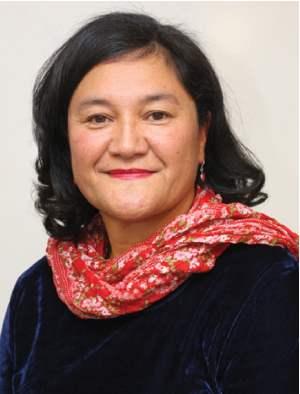From the CEO
May 1, 2014

Chief executive officer Arihia Bennett
 Several weeks ago we welcomed the arrival of Frida Grace into our extended whānau. The build-up to Frida’s arrival has been a world journey for my niece, who deliberately chose to return to New Zealand so that her child would be born into an environment of whānau support.
Several weeks ago we welcomed the arrival of Frida Grace into our extended whānau. The build-up to Frida’s arrival has been a world journey for my niece, who deliberately chose to return to New Zealand so that her child would be born into an environment of whānau support.
As Frida begins her journey, she is entirely dependent on her mother for all those basic physical nurturing requirements that will give her a healthy start to life.
Meanwhile, we dote over Frida’s every sound and, monitor her growth, her feeding, and her sleeping regime, as well as the many nappy changes that will go on for quite some time.
We sit around and discuss who she looks like, who she will take after and what her career will be. Naturally, because we are based in Canterbury, the conversation gets around to what school she will go to.
I immediately think of how Frida will benefit from our tribal direction on education. As Ngāi Tahu develops an education strategy, we must think of it as lifelong learning, and if we are going to support the development of Frida and those like her, we must start at the beginning – from early childhood.
In the past it’s been too easy to sprint past this phase straight into compulsory and even tertiary education as we strive to see our young talent in career pathways. I think we should learn to crawl first, and that begins by making sure our whānau get quality early childhood education.
These early years give us a window of opportunity to nurture and grow the potential of our rangatahi. To do this, we must focus on quality early childhood education options while ensuring there is wrap-around support, information, and assistance available to parents.
Frida’s mum is enthusiastic and not shy to ask where she can seek such assistance. Her first start is with Tamariki Ora, and so, with a New Jersey accent, she starts to practice her pronunciation of Te Pūawaitanga before the Kaiwhakapuawai arrives. Then she is quickly onto downloading all the detail on Whai Rawa, while eagerly awaiting the arrival of her new daughter’s birth certificate.
At a tribal leadership level, we should aim high when it comes to education outcomes, setting strategies that bring better learning opportunities and greater participation. I believe this cannot be achieved in isolation, and it demands a wrap-around approach to guide and support parents as they aim to be their child’s constant coach, mentor, and champion.
I am confident of Frida’s future because her mum will ask questions of those around her, and trust me, there will be no shortage of feedback. It’s this sort of support that will enable my niece to make well-informed decisions for her daughter’s education and well-being.